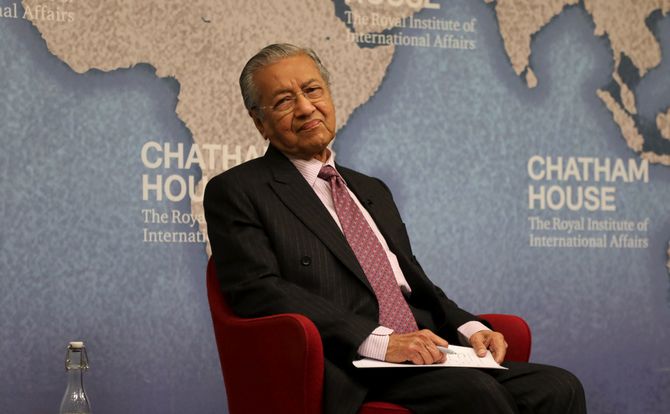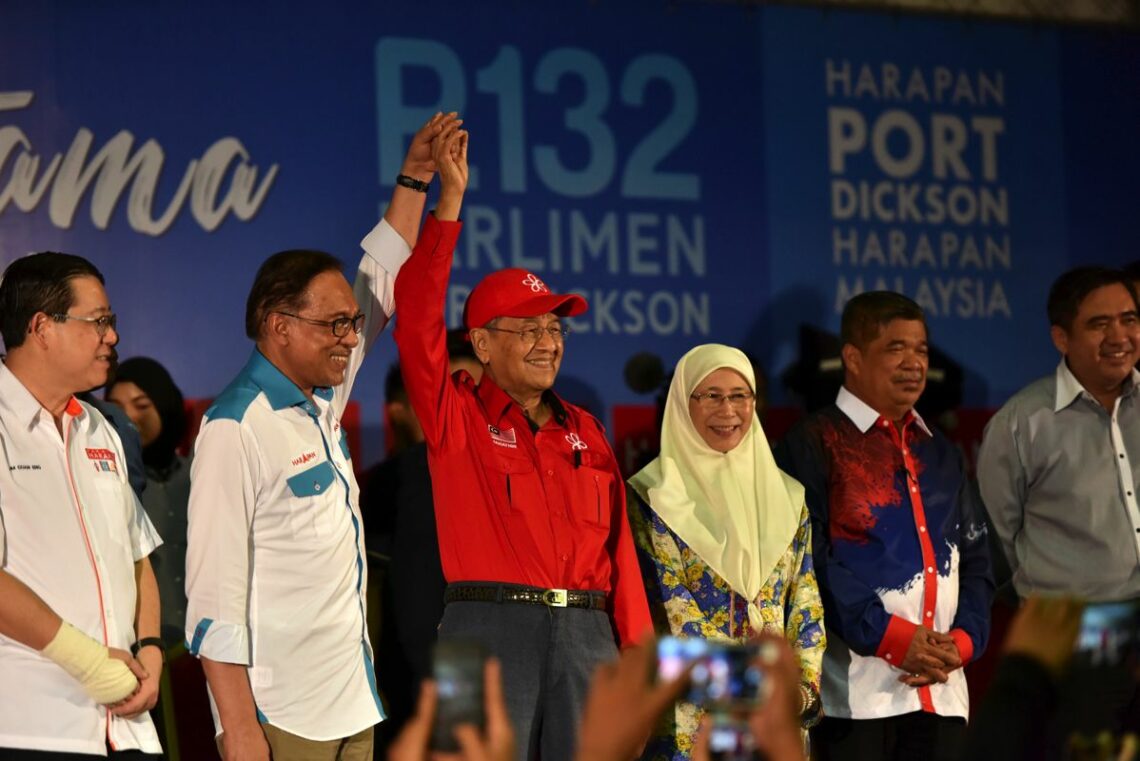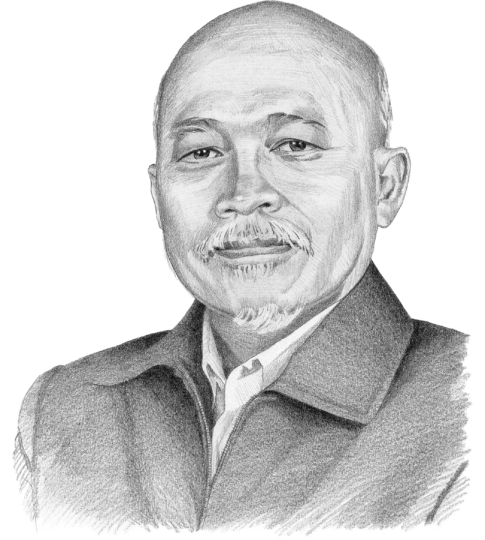Malaysia’s political transition: Mahathir to Anwar 2.0
Before his return to the office at the unlikely age of 93, Malaysian Prime Minister Mohamad made a deal to hand over power after an interim period to his former deputy-turned-bitter rival Anwar Ibrahim. Although it might take Dr. Mahathir more than two years to clean up the previous government’s mess, Mr. Anwar seems content to wait.

In a nutshell
- Malaysia’s new prime minister made a deal to step down in two years “more or less”
- There is good reason to believe the once-autocratic Dr. Mahathir will keep this promise
- After his designated successor, Anwar Ibrahim, Malaysia needs a new generation of leaders
While in Brunei on September 2, 2018, Malaysian Prime Minister Mahathir Mohamad spoke to a gathering of Malaysians working or residing in the Sultanate. During question time, he was asked − for the umpteenth time since becoming prime minister on May 10 − about his plan for political succession. Repeating his stock reply, Dr. Mahathir (who gave up a medical practice for politics in the 1960s) was reported by the Malaysian news agency Bernama as saying he would be the “interim prime minister with the time frame mentioned as two years” before handing over to Anwar Ibrahim. “I am confident that he is now more mature and much experienced,” the prime minister added, as if there were any doubt in anyone’s mind that Mr. Anwar was more than capable of taking over.
Interestingly, Prime Minister Mahathir seemed far from exasperated at being constantly queried about the succession, over and over again, by the insatiably inquisitive media and the public. When the next occasion came, at a business forum in New York on September 26, during a session of the United Nations General Assembly, this is how he put it: “I made a promise that I would not stay long as prime minister. Maybe two years, maybe more, maybe less.” And will Mr. Anwar be the next prime minister? “That is my promise,” he said again, with no equivocation.
Sooner or later
Dr. Mahathir stepping down in favor of Mr. Anwar was a central piece of the succession plan signed between the two iconic leaders before the May 2018 general election. It was part of the power-sharing pact signed by the four parties in Malaysia’s then-opposition coalition Pakatan Harapan (Alliance of Hope, or PH), which included Dr. Mahathir’s PPBM (also known as Bersatu) and Mr. Anwar’s People’s Justice Party (PKR), the coalition’s largest component.
An aspect much discussed in some circles, though not widely known, was that the pact was predicated on Dr. Mahathir stepping down sooner rather than later. But Prime Minister Mahathir’s public “promise” in New York was the first time he had committed himself openly to a two-year time frame for handing over power to Mr. Anwar.
For two decades, the rivalry between Dr. Mahathir and Mr. Anwar cast a long shadow in Malaysian politics.
Before the historic May election, the two men had been locked in a bitter rivalry that had cast a long shadow on Malaysian politics, ever since then Prime Minister Mahathir (1981-2003, 2018) dismissed Mr. Anwar as deputy prime minister amid allegations of corruption – for which he served a six-year prison sentence. Mr. Anwar was also found guilty of sodomy, though this charge was overturned. (Another allegedly politically motivated sodomy conviction sent Mr. Anwar back to prison in 2015, though he continued to inspire the opposition PKR from behind bars).
The two men only buried the hatchet in 2016, when Dr. Mahathir unexpectedly showed up in court to support his imprisoned former deputy. It was their first friendly meeting since they parted ways nearly two decades before. Two years later, the alliance was formalized as they joined together to defeat scandal-tainted Prime Minister Najib Razak (2009-2018) in the May 2018 general election.
Informal agreement
Both Dr. Mahathir and Mr. Anwar knew that this year’s ballot provided a golden opportunity to oust Prime Minister Najib and his ruling Barisan Nasional (National Front, or BN), which had become embroiled in a financial scandal involving the diversion of more than $1 billion from the state-controlled 1Malaysia Development Berhad (1MDB) sovereign fund into Mr. Najib’s personal accounts.
According to their power-sharing pact, should the opposition PH win, Dr. Mahathir would become prime minister – Malaysia’s seventh − for about two years; he would then make way for Mr. Anwar to take over. “We need to form a coalition to defeat Najib (Razak). The coalition must include Anwar’s party. The condition for Anwar to join the coalition is that he will be the next prime minister after me,” is how Dr. Mahathir explained the political logic.
But while the broad outlines of the political succession were clear enough, its timing was not. Prime Minister Mahathir is realistic that at 93, time is not on his side. Yet the task of cleaning up after the Najib government will be tough and take considerable time. Hence Dr. Mahathir‘s reluctance to be pinned down to a two-year limit, preferring to add the rider “maybe more, maybe less.” Even so, Malaysia’s longest-serving prime minister is unlikely to want to end his career by having another spectacular falling out with his former protege – especially after triumphantly defusing the most explosive feud in domestic politics.
Mr. Anwar, in his public statements, has also been careful to avoid talking about a specific schedule. In fact, in an exclusive interview with this author in mid-September, Mr. Anwar went out of his way to stress that the timing of the succession was something that had been agreed informally, not set out in black in white. He added that he was in no hurry to take over. “Our attitude is that [Dr.] Mahathir should be given the latitude and space to continue with the task,” Mr. Anwar said.

In the interview, Mr. Anwar revealed that his patience was driven by political pragmatism. Setting a date for the handover would simply undermine Dr. Mahathir’s effectiveness, not a desirable outcome given the gravity of the tasks facing his government. “The only clarity [to be gained] is that the prime minister becomes a lame duck. I don’t want that. I want him to be effective,” said Mr. Anwar. Perhaps for that reason, all the initial talk about Prime Minister Mahathir’s “interim” status later dissipated.
Both Dr. Mahathir and Mr. Anwar appear eager to reassure each other that the succession plan will proceed smoothly this time, unlike in 1998. One possibility is that Dr. Mahathir will leave the final decision on whether to add or subtract a few months to the succession schedule to Mr. Anwar. This would suggest there is a tacit understanding between the two men that Dr. Mahathir is ready to leave office earlier than expected.
However, Prime Minister Mahathir has publicly acknowledged that he is “under pressure” from his own party to serve a full five-year term. Even so, he states that he will stick to his “promise” to make way for Mr. Anwar as agreed, sooner rather than later.
Division of labor
Immediately after the election, Dr. Mahathir honored his side of the bargain by helping secure for Mr. Anwar a royal pardon for his sodomy conviction and his release from prison. Five months later, Mr. Anwar took the critical step of making himself eligible to take the reins of power by winning a parliamentary seat in a special by-election at Port Dickson, in central Malaysia. Only members of parliament are eligible to become prime minister. Dr. Mahathir even broke with his own practice of not campaigning during by-elections to quash speculation that he did not support Mr. Anwar. The latter won handsomely, garnering more than two-thirds of the votes cast.
Now that he is back in parliament, Mr. Anwar can be truly regarded as Malaysia’s “prime minister-in-waiting,” ready to take over – barring unforeseen circumstances – if and when Dr. Mahathir decides to step aside. The two men’s political reconciliation has been the most important development in Malaysian politics in the past decade, upending the political landscape and ushering in a new era. In another sense, however, it only revived the old partnership and succession arrangement that was disrupted in 1998.
Under the new division of labor, Dr. Mahathir will run the country while Mr. Anwar focuses on party politics.
Under the new division of labor, Dr. Mahathir will run the country over the next year or two while Mr. Anwar focuses on reforming parliamentary and party politics. Their declared goal – after 60 years of uninterrupted rule by the BN – is to install a political system with effective checks and balances.
There are still reasons to question the durability of the deal. Despite the almost unanimous assurances from his closest associates that Dr. Mahathir has mellowed, his past political tendency has been to gather as much power as possible into his own hands. Concerns about the prime minister returning to his autocratic ways were revived by recent speculation that he might try to “cherry-pick” defecting lawmakers from the BN’s backbone party, the United Malays National Organisation (UMNO), in order to strengthen his own leverage vis-a-vis Mr. Anwar.
But as Mr. Anwar himself has remarked recently, “nothing would seem as disruptive … as two erstwhile political adversaries collaborating.” Both men realize that their alliance has created enough energy to reshape the country’s entire political system. A reminder of this fact is the seemingly endless attempts by third parties to drive a wedge between the two leaders.
After Anwar
Part of the new government’s reform drive will involve setting a two-term, 10-year limit on prime ministers. Gone will be the days of long-serving leaders like Dr. Mahathir, now 22 years in office and counting. That means his chosen successor, Mr. Anwar, can expect to serve a decade at most. Yet even that could be optimistic, since Mr. Anwar is already 71 years of age. The long-term stability of Malaysia’s new political order will hinge on what happens after him.
Under Malaysia’s current system, the dominant party in the ruling coalition would ordinarily take the premiership (note, however, that this is not the case with Dr. Mahathir’s PPBM). If and when Mr. Anwar takes over as prime minister, there has been speculation that his deputy would be Muhyiddin Yassin, the PPBM president who is currently minister of home affairs.
However, Mr. Muhyiddin underwent an operation in July for early-stage pancreatic cancer. Should he be forced to step aside for health reasons, there would be no obvious successors to Dr. Mahathir and Mr. Anwar at the top of the ruling coalition. This makes the internal elections now taking place in Mr. Anwar’s PKR critical.
As the power struggle in the ruling coalition sorts itself out, the dominant theme will be ensuring a stable transition.
A fierce contest is already under way between two of Mr. Anwar’s staunchest allies. Economic Minister Azman Ali started off as Mr. Anwar’s private secretary, but he is also close to Dr. Mahathir. His rival is a 41-year-old Anwar diehard, Rafizi Ramli, Western-educated and a sharp critic of corruption under the Najib regime.
Even as the power struggle in parts of Malaysia’s ruling coalition sorts itself out, the dominant theme will remain ensuring a stable transition from the Barisan Nasional regime. The path will not be straightforward. On December 17, for example, Nurul Izzah Anwar, Mr. Anwar’s daughter and a rising star in the PKR, resigned from her post as vice president of the party, apparently in protest against the PPBM’s alleged maneuvering to bolster its ranks with tainted former members of the UMNO.
Yet Dr. Mahathir and Mr. Anwar are highly conscious of the need to remain united for the sake of the country. Their overriding concern is about how to recover from the waste and corruption of Mr. Najib’s years in power. Both men share an ambition to make Malaysia Asia’s next tiger economy and lift their country into the ranks of the developed world.








